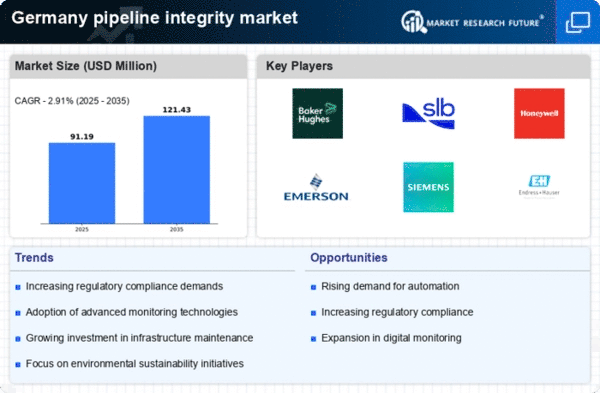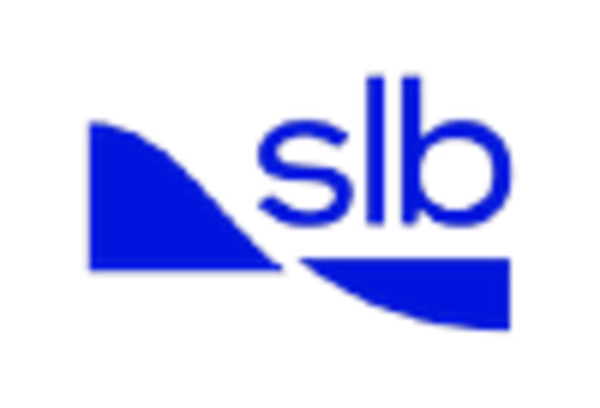Rising Demand for Energy Security
Germany's commitment to energy security is a pivotal driver for the pipeline integrity market. The transition towards renewable energy sources necessitates a robust pipeline infrastructure to transport energy efficiently. As the country aims to reduce its reliance on fossil fuels, the integrity of existing pipelines becomes paramount. The government has set ambitious targets, including a 65% reduction in greenhouse gas emissions by 2030, which requires a reliable pipeline network to support the integration of renewable energy. This shift is likely to increase investments in pipeline integrity solutions, as operators seek to ensure the safe and efficient transport of energy. The growing emphasis on energy security is expected to create opportunities for innovative technologies within the pipeline integrity market.
Increasing Infrastructure Investment
The pipeline integrity market in Germany is experiencing a surge in infrastructure investment, driven by the need to modernize aging pipeline systems. The German government has allocated substantial funds, estimated at €10 billion, for infrastructure upgrades over the next five years. This investment aims to enhance the safety and efficiency of pipeline operations, thereby reducing the risk of leaks and failures. As a result, companies are increasingly adopting advanced integrity management solutions to comply with stringent regulations. The focus on maintaining and upgrading existing pipelines is likely to propel the demand for integrity monitoring technologies, which are essential for ensuring operational reliability. Consequently, this trend is expected to significantly impact the pipeline integrity market, fostering growth and innovation in the sector.
Growing Public Awareness and Advocacy
Public awareness regarding environmental issues and pipeline safety is on the rise in Germany, influencing the pipeline integrity market. Advocacy groups and community organizations are increasingly vocal about the need for safe and environmentally responsible pipeline operations. This heightened scrutiny is prompting companies to prioritize integrity management practices to maintain public trust and avoid backlash. The potential for reputational damage and financial loss due to public opposition is driving operators to invest in transparent and effective integrity solutions. As public sentiment continues to evolve, the pipeline integrity market is likely to adapt, with companies focusing on enhancing their operational practices to align with societal expectations.
Environmental Regulations and Compliance
The stringent environmental regulations in Germany are a critical driver for the pipeline integrity market. The government has implemented comprehensive policies aimed at minimizing environmental impact, which necessitates rigorous compliance from pipeline operators. Companies are required to adopt best practices in pipeline management to prevent leaks and spills, thereby safeguarding natural resources. The financial implications of non-compliance can be substantial, with penalties reaching up to €1 million for serious violations. This regulatory landscape compels operators to invest in advanced integrity management systems, which are essential for ensuring compliance and protecting the environment. As such, the focus on environmental regulations is expected to significantly influence the pipeline integrity market.
Technological Advancements in Monitoring
Technological advancements are reshaping the pipeline integrity market in Germany, with innovations in monitoring and inspection technologies gaining traction. The adoption of smart sensors and IoT devices enables real-time monitoring of pipeline conditions, enhancing the ability to detect potential issues before they escalate. This proactive approach is crucial for maintaining pipeline integrity and minimizing environmental risks. The market for pipeline monitoring technologies is projected to grow at a CAGR of 8% over the next five years, reflecting the increasing reliance on data-driven solutions. As companies strive to enhance operational efficiency and comply with regulatory requirements, the integration of advanced monitoring technologies is likely to play a significant role in the pipeline integrity market.
















